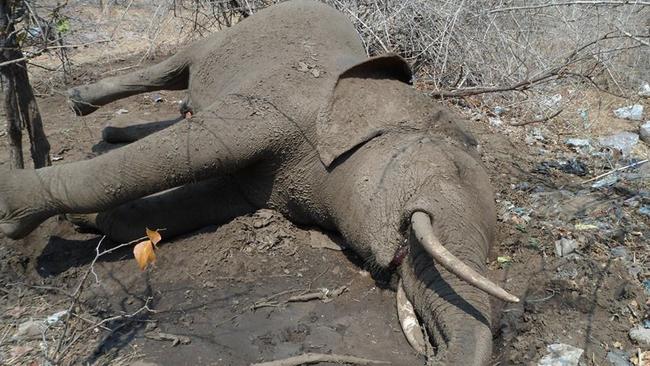Suspected poachers kill 14 elephants with cyanide in Zimbabwe
SUSPECTED poachers have killed 14 elephants with cyanide-laced oranges and salt licks in three separate incidents in Zimbabwe. WARNING: Distressing.

WARNING: DISTRESSING IMAGES
FOURTEEN elephants have been poisoned by cyanide in Zimbabwe in three separate incidents, two years after poachers killed more than 200 elephants by poisoning.
Zimbabwe’s National Parks and Wildlife Management Authority said three elephants were killed in Matusadona National Park in the Kariba area in northern Zimbabwe and 11 more pachyderms were found dead in two different spots in Hwange National Park in western Zimbabwe over the past two weeks.
In all cases the elephants were killed by cyanide, according to kidney and liver samples from the dead elephants tested by the Biological Sciences Department, said parks spokeswoman Caroline Washaya Moyo.
In Kariba, poachers laced oranges with cyanide, she said, while in Hwange the poison was put on salt licks.
The ivory tusks had been cut off six elephants at one location in Hwange park but the other five elephants still had their tusks, suggesting the poachers were disrupted. The motive for the killings in Matusadona was not known.
There have been no arrests so far over the latest incidents, said Clement Munoriarwa, police commander for Mashonaland West province.
“We have had a number of poaching activities in the province, they are actually increasing each day,” said Munoriarwa on state television. “Some are done through the use of firearms and, of course, we have cases where we suspect that there is cyanide poisoning.”
A $US400 reward for information leading to the arrest and conviction of the poisoners has been offered by the Matusadona Anti-Poaching Project, a private organisation, according to its Facebook page, which said that more elephants may have been poisoned.
The organisation also announced that three suspects have been arrested over the Kariba killings.
In 2013, as many as 300 elephants died in Hwange park after poachers laced salt pans with cyanide. Many vultures died after feeding on the poisoned elephant carcasses and it is feared that will happen again. Cyanide is widely used in Zimbabwe’s mining industry and is therefore relatively easy to obtain.
Although elephants are vulnerable across Africa, Zimbabwe has a large elephant population. The national parks estimates it has more than 100,000, although the parks land should ideally only support 40,000 elephants.
Also Tuesday, a Zambian man claiming to be a born-again Christian was arrested in Zimbabwe for trying to smuggle ivory weighing 25 kilograms and valued at $US6320 into South Africa. The Zambian, Obie Chola, 31, was also found carrying a three-metre python skin, according to the national parks spokeswoman.



